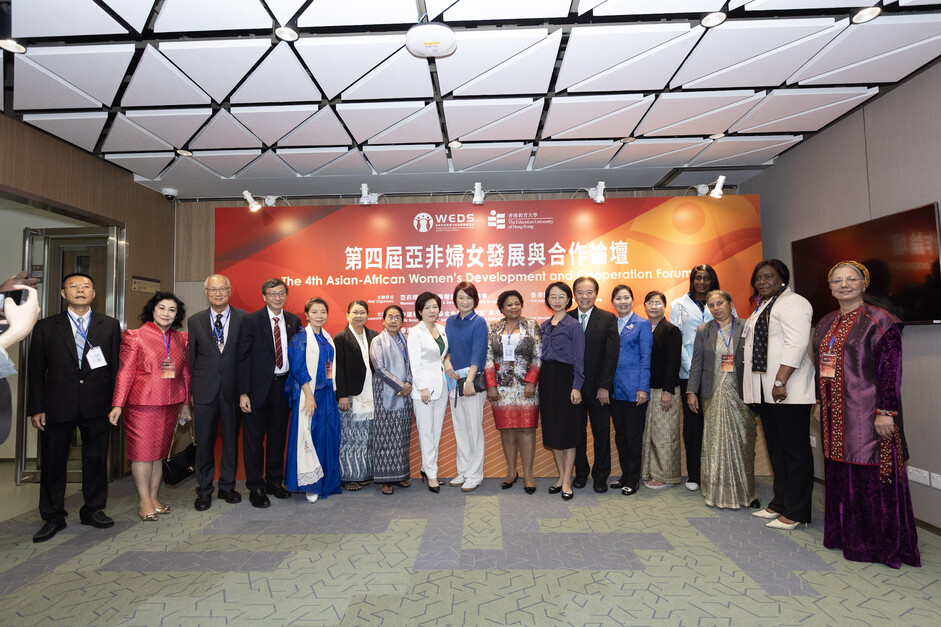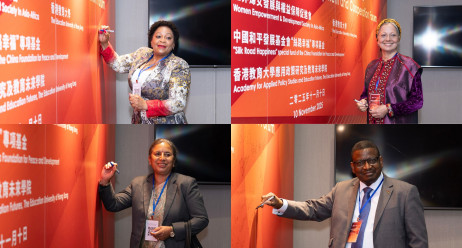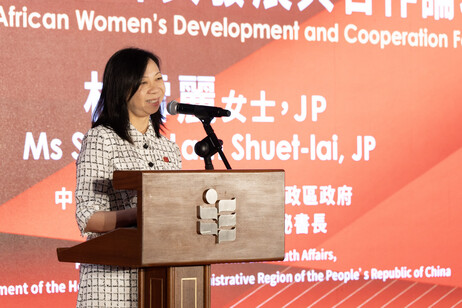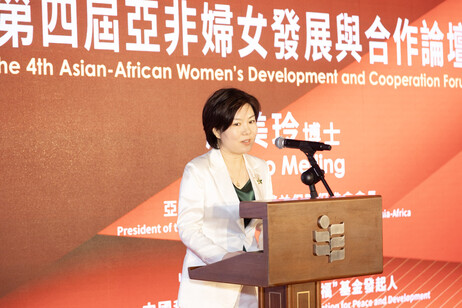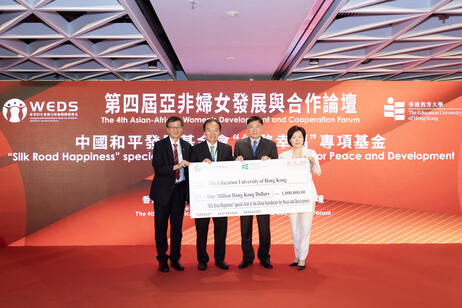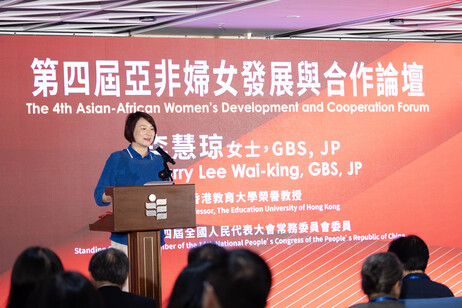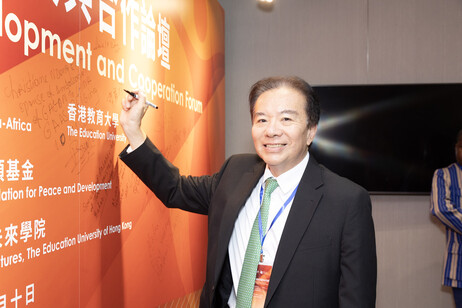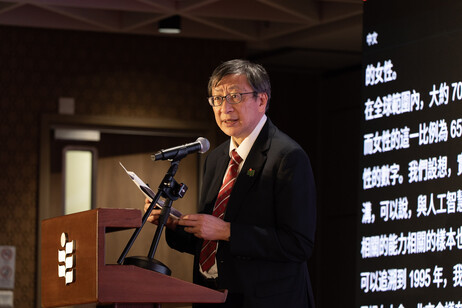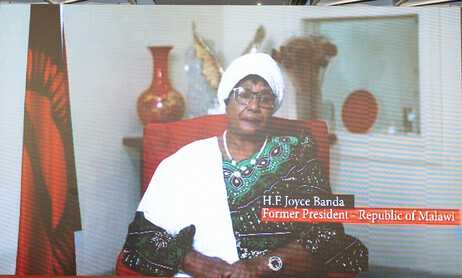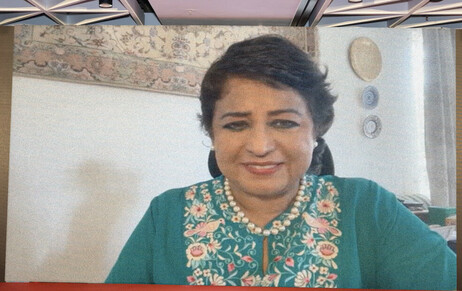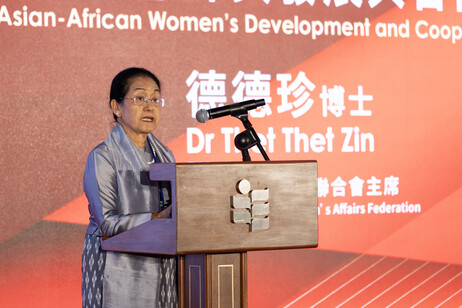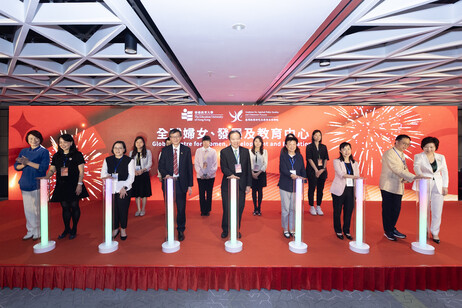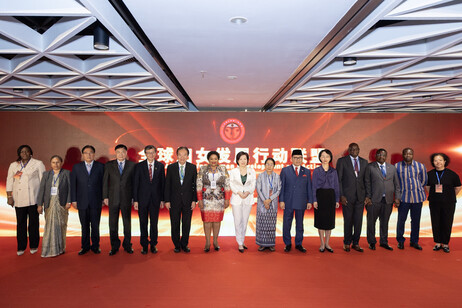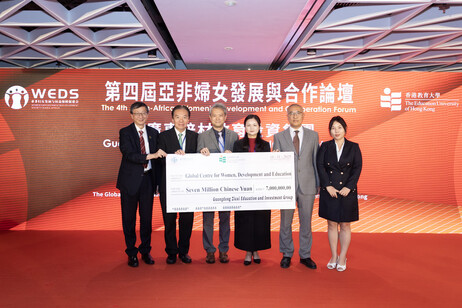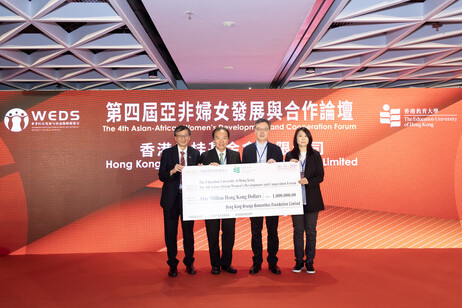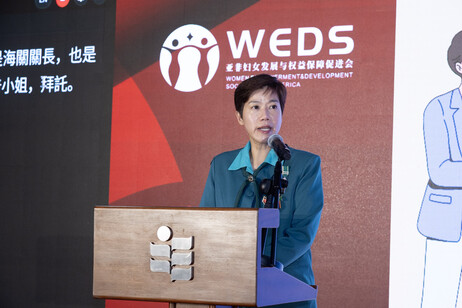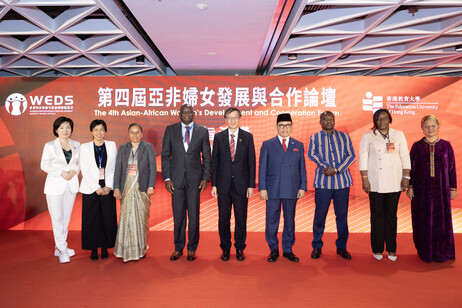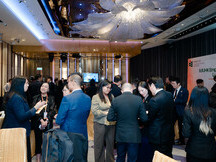EdUHK and WEDS Co-host 4th Asia-African Women’s Forum
Launch Global Centre and Alliance to Advance Women’s Empowerment in the AI Era
The 4th Asia-African Women’s Development and Cooperation Forum was held today (10 November) at The Education University of Hong Kong (EdUHK). Centered on the theme “Opportunities and Challenges for Women’s Development in the Age of AI,” the forum brought together, both in person and online, former presidents and dignitaries, ambassadors to China, representatives of international women’s organisations, renowned scholars, and influential social leaders from across Asia and Africa to explore new opportunities for women’s advancement in education, technology, and social innovation.
According to United Nations (UN) figures, over 250 million women worldwide still lack access to basic education. As Hong Kong’s only university dedicated to teacher education, EdUHK has aligned itself with the UN’s Sustainable Development Goals—particularly Goal 5 (Gender Equality) and Goal 10 (Reduced Inequalities).
To further this commitment, EdUHK announced during the forum the official launch of the Global Centre for Women, Development and Education (Centre). Backed by approximately HK$10 million in donations from private institutions and charitable organisations, the Centre will foster collaboration among women in the Global South through research, training and dialogue. It aims to build leadership, expand opportunities in employment and entrepreneurship, and promote inclusive development through partnerships with governments, businesses and social enterprises.
Global Leaders Unite for Women’s Development
The forum featured keynote addresses from global leaders and distinguished guests, including H.E. Dr Joyce Banda, former President of Malawi, H.E. Dr Ameenah Gurib-Fakim, former President of Mauritius, Ms Shirley Lam Shuet-lai, Permanent Secretary for Home and Youth Affairs from the HKSAR Government, H.E. Nomvula Mokonyane, First Deputy Secretary-General of the African National Congress, Ms Starry Lee Wai-king, Standing Committee Member of the 14th National People’s Congress of the People’s Republic of China and Honorary Professor of EdUHK, Dr Thet Thet Zin, President of the Myanmar Women’s Affairs Federation, Ms Louise Ho Pui-shan, Chief Commissioner of The Hong Kong Girl Guides Association and former Commissioner of Customs and Excise Department, Dr David Wong Yau-kar, EdUHK Council Chairman, and Professor John Lee Chi-Kin, EdUHK President and Member of the 14th National Committee of the Chinese People's Political Consultative Conference.
In her opening remarks, Dr Zhao Meiling, President of the Women Empowerment & Development Society in Asia-Africa (WEDS) and initiator of the Silk Road Happiness Fund, China Foundation for Peace and Development, emphasised the need for inclusive AI. “Women’s development is a measure of social progress and a foundation for sustainable growth,” she said. “The AI era we envision must pair technological advancement with human warmth, drive innovation with inclusivity, and serve the common good. Together, we must ensure AI becomes a tool to close - not widen, the gender digital divide, bringing real benefits to all of humanity.”
Ms Shirley Lam Shuet-lai, Permanent Secretary for Home and Youth Affairs of the HKSAR Government, emphasised that women are a vital force in driving social progress and sustainable development. She stated: “Women make up 54% of Hong Kong’s total population and have a significant impact in professional fields and public service. This year, Hong Kong once again hosts this prominent event, providing local women with the opportunity to interact with representatives from Asia and Africa, showcasing Hong Kong’s unique strengths and its important role as a ‘super connector.’ Hong Kong will continue to promote the spirit of the Beijing World Conference on Women, and work with you all to accelerate the full development of women.”
In their video addresses, former President of Malawi H.E. Dr Ameenah Gurib-Fakim and former President of Mauritius, reflected on the longstanding friendship and cooperation between their countries and China. They acknowledged the significant progress made in advancing women's rights globally over the past three decades. Both leaders emphasised the critical role of women in areas such as digital infrastructure, green industrialisation, and AI governance, and called for the establishment of a global governance framework to guide the development and application of AI technologies - promoting gender inclusion and sustainable development.
Dr David Wong Yau-kar, Council Chairman of EdUHK, stated: “Women in the Global South continue to face cultural, economic, and social challenges today that demand urgent and systemic solutions. Education stands as the most powerful catalyst for change – it unlocks economic opportunity, nurtures leadership, and builds resilience in the face of systemic barriers. We’re deeply grateful to the donors and educational institutions who share our vision. Their generous support has enabled the establishment of the Global Center for Women, Development and Education, empowering us to advance diverse development for women – particularly across Asia and Africa.”
New Global Centre and Alliance for Women’s Development Launched
Professor John Lee Chi-Kin, President of EdUHK, extended his heartfelt gratitude to three major donors for their generous support. “As Hong Kong’s largest teacher education university, we’re uniquely positioned to advance women’s development and social inclusion,” he said. “I’m especially thankful to Guangdong Zicai Education and Investment Group, 'Silk Road Happiness' Special Fund of the China Foundation for Peace and Development, and the Hong Kong Orange Osmanthus Foundation Ltd. Their contribution will enhance our efforts to connect women across the globe and drive progress in research, technology, and policy.”
The new Centre will not only conduct impactful academic research and drive policy innovation on women’s issues, but will also build a transnational network for collaboration. It will offer master’s programmes focused on women, development, and education, and provide targeted training for women from the Global South to strengthen their skills in employment and entrepreneurship. In addition, the Centre plans to host regular international forums to foster cross-regional dialogue on women’s development, injecting fresh momentum into global efforts to advance gender equality.
Guests also witnessed the launch of the Global Alliance for Women’s Development Action, which will unite partners across sectors to advance international initiatives, promote women’s well-being, and foster a global community with a shared future for women.
The forum featured 13 keynote sessions addressing topics such as education, employment, empowerment, equal opportunity, and leadership. Speakers shared compelling insights on the evolving role of women in the AI era and the urgent need for inclusive innovation. Several highlighted China’s development as a catalyst for global progress and women’s empowerment, with growing attention to international AI governance. African representatives shared how their nations are advancing digital infrastructure and green industries to promote inclusive growth. In Hong Kong, speakers shared that initiatives such as the Women’s Empowerment Fund and mentorship programmes are driving female advancement, with women increasingly taking on leadership roles. Discussions also explored the dual impact of AI—its promise for women and the risks it press — reinforcing the need of gender-inclusive governance and youth engagement to shape a more equitable and harmonious technological future.
-Ends-
